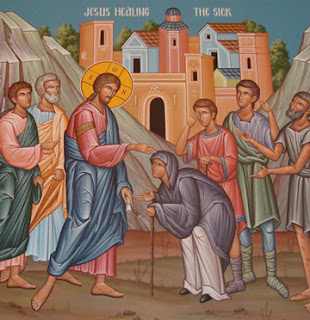February
Trinity
Matthew
20: 1-16
 [But
many who are last will be first, and many who are first will be last.] The
kingdom of the heavens is like a man, the master of his house, who went out
early in the morning to hire workers for his vineyard. Agreeing to pay them one
denarius a day, he sent them out into his vineyard.
[But
many who are last will be first, and many who are first will be last.] The
kingdom of the heavens is like a man, the master of his house, who went out
early in the morning to hire workers for his vineyard. Agreeing to pay them one
denarius a day, he sent them out into his vineyard.
At
about nine o’clock, he went out and saw others standing in the marketplace, and he
said to them, “Go also into my vineyard, and I will give you whatever is
right.” So they went.
He
went out again at about noon and at three o’clock and did the same. At five o’clock, he
went out and found others standing there, and he said to them, “Why do you
stand here all day idle?” They said, “Because no one has hired us.” He said,
“You, too, go into the vineyard.”
And
when evening came, the master of the vineyard said to his steward, “Call the
workers and give them their wages, beginning with the last ones hired and going
on to the first.”
Those
who had been hired at five o’clock came forward, and each received one denarius.
Therefore, when it was the turn of those who were hired first, they expected to
receive more. However, they too also received one denarius each.
They took it,
but they began to grumble against the master of the house. “These men who were
hired last only worked one hour, and you have made them equal to us, who have
borne the burden of the work and the heat of the day.”
 |
| Burnand |
However,
he answered one of them, saying, “Friend, I am not being unjust to you. Did you
not agree with me for one denarius? Take what you have earned and go. I wish to
give to the man hired last the same as I give to you. Have I not the right to
do as I wish with what is mine? Or do you give me an evil look because I am
generous? Thus will the last be first and the first will one day be last."
1st February Trinity
Feb 9, 2020
Matthew 20:1-16
The story in today’s reading seems to be about fairness.
Those who worked the entire day feel entitled to more than a day’s wage,
because those who seemed to do less received the same day’s wage.
 |
| van Gogh |
But on a social level, the story is actually about a
generosity that is beyond fairness. The master, the great and generous heart of
the world, would give daily bread, sustenance to all. Human dignity requires
that all be sustained, regardless of circumstance. That is also our own human
task—to work to feed others, not just ourselves.
On yet another level, this story is also about the broader
reasons we labor on earth at all. Each day we come back from the fields of
night, where we received our inspirations for the work of earth. We are all day
laborers working on our own sense of self, our own integrity, our own
great-heartedness. To be without outer work is to suffer a loss of meaning, loss
of relationships to others, loss of a sense of self, and one’s place in the
community.
For we have all come to labor on the fields of earth to
build up our own inner strength, and to join with others in doing God’s work of
earth, even if we appear to have no outer job at all. The poet Mary Oliver
wrote:
My work is loving the world.
….Let me
keep my mind on what matters,
which is my work,
which is mostly standing still and
learning to be
astonished.
Which is mostly rejoicing….
which is gratitude, to be given a
mind and a heart
and these body-clothes,
a mouth with which to give shouts
of joy
to the moth and the wren, to the
sleepy dug-up clam,
telling them all, over and over,
how it is
that we live forever.*
*Mary Oliver, “Messenger,” in Thirst
















